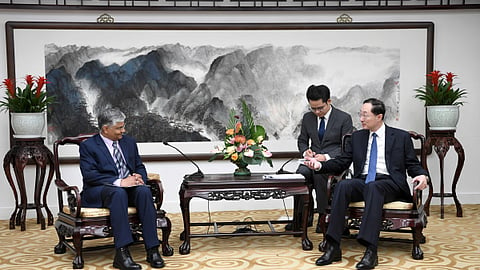

NEW DELHI: India has urged China to ensure stability and transparency in the supply of rare earth elements, following Beijing’s move to impose special export permits on seven critical minerals and associated magnets.
The issue is expected to be a key agenda item during the visit of Chinese Vice Foreign Minister Sun Weidong, who is in India for a two-day trip starting Thursday.
“The Chinese Ministry of Commerce and General Administration of Customs, in early April, announced their decision to implement export controls on certain rare-earth related items. We remain in touch with the Chinese side, in Beijing as well as in Delhi, to bring predictability in supply chain for trade consistent with international practices,” External Affairs Ministry spokesperson Randhir Jaiswal said.
China’s export restrictions, effective April 4, cover rare earths such as samarium, gadolinium, terbium, dysprosium, and lutetium — materials vital for electric motors, advanced braking systems, smartphones, and missile technologies.
India’s auto sector, particularly electric vehicle (EV) manufacturers, has begun to feel the impact. Most automakers currently hold 4–6 weeks of inventory; however, extended delays could start affecting production schedules, with EV launches facing potential deferrals or rescheduling as early as July 2025.
The industry has called on the government to help expedite Chinese approvals for rare earth magnet imports. These magnets are essential to permanent magnet synchronous motors (PMSMs), which deliver high torque and energy efficiency in EVs.
If the supply bottlenecks persist, broader disruptions could hit internal combustion engine (ICE) passenger vehicles and two-wheeler segments as well.
Sun’s visit reflects a measured thaw in bilateral relations, coming on the heels of the completion of troop disengagement in eastern Ladakh, effectively ending a nearly five-year military standoff. It also follows a meeting between Prime Minister Narendra Modi and President Xi Jinping on the sidelines of the SCO Summit in Russia last October, and the resumption of Special Representatives’ talks on the boundary issue in December. He will hold talks with Foreign Secretary Vikram Misri and is expected to call on national security adviser Ajit Doval.